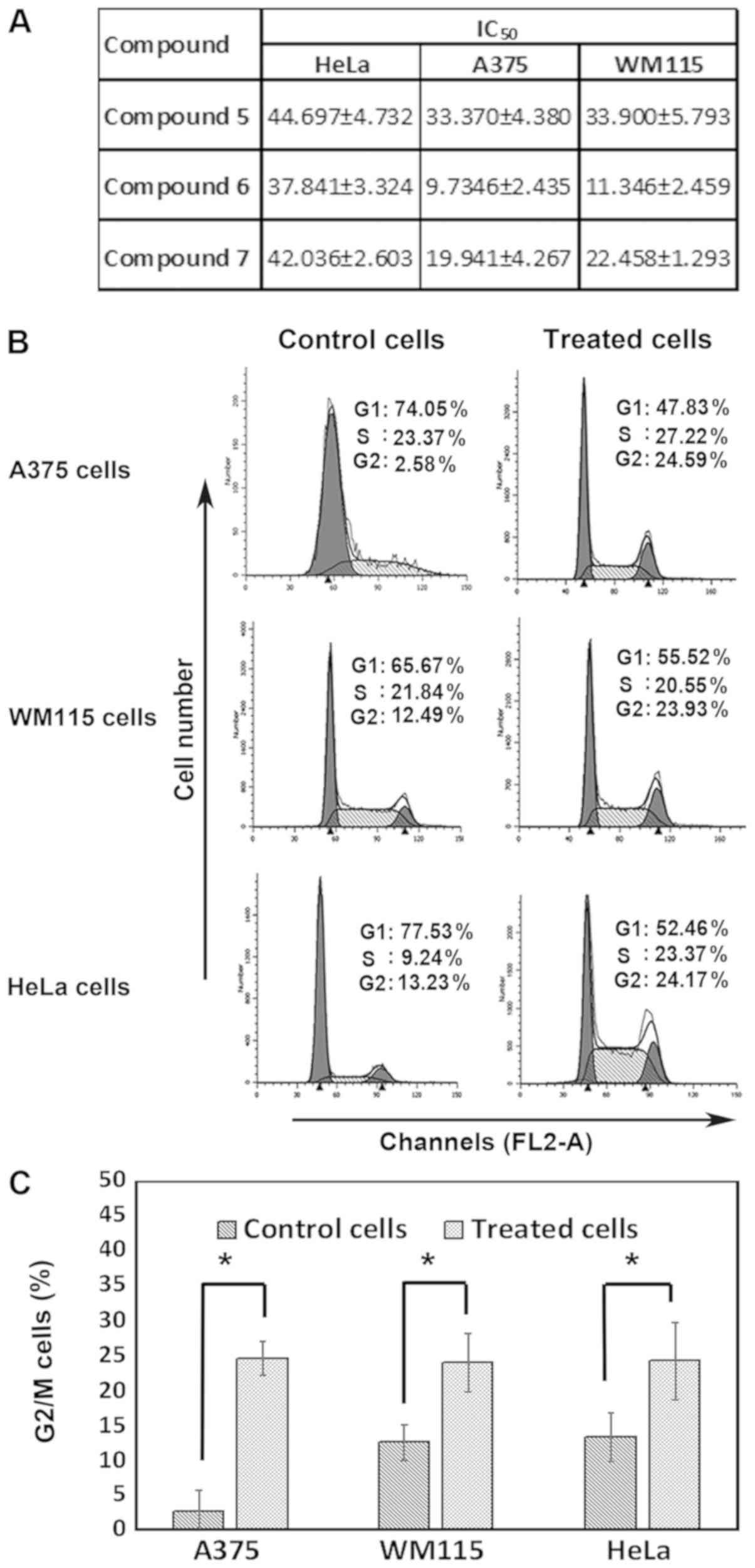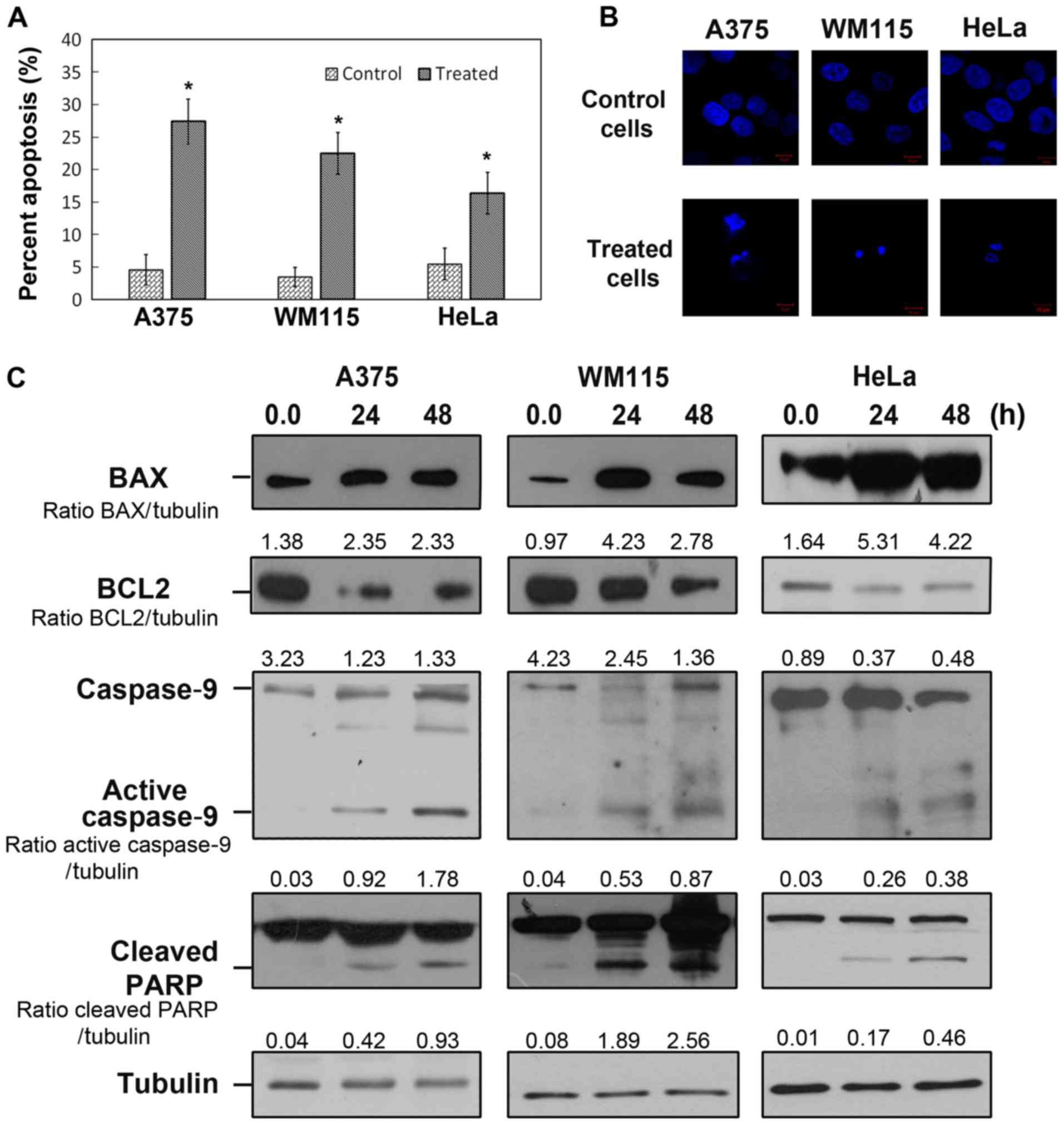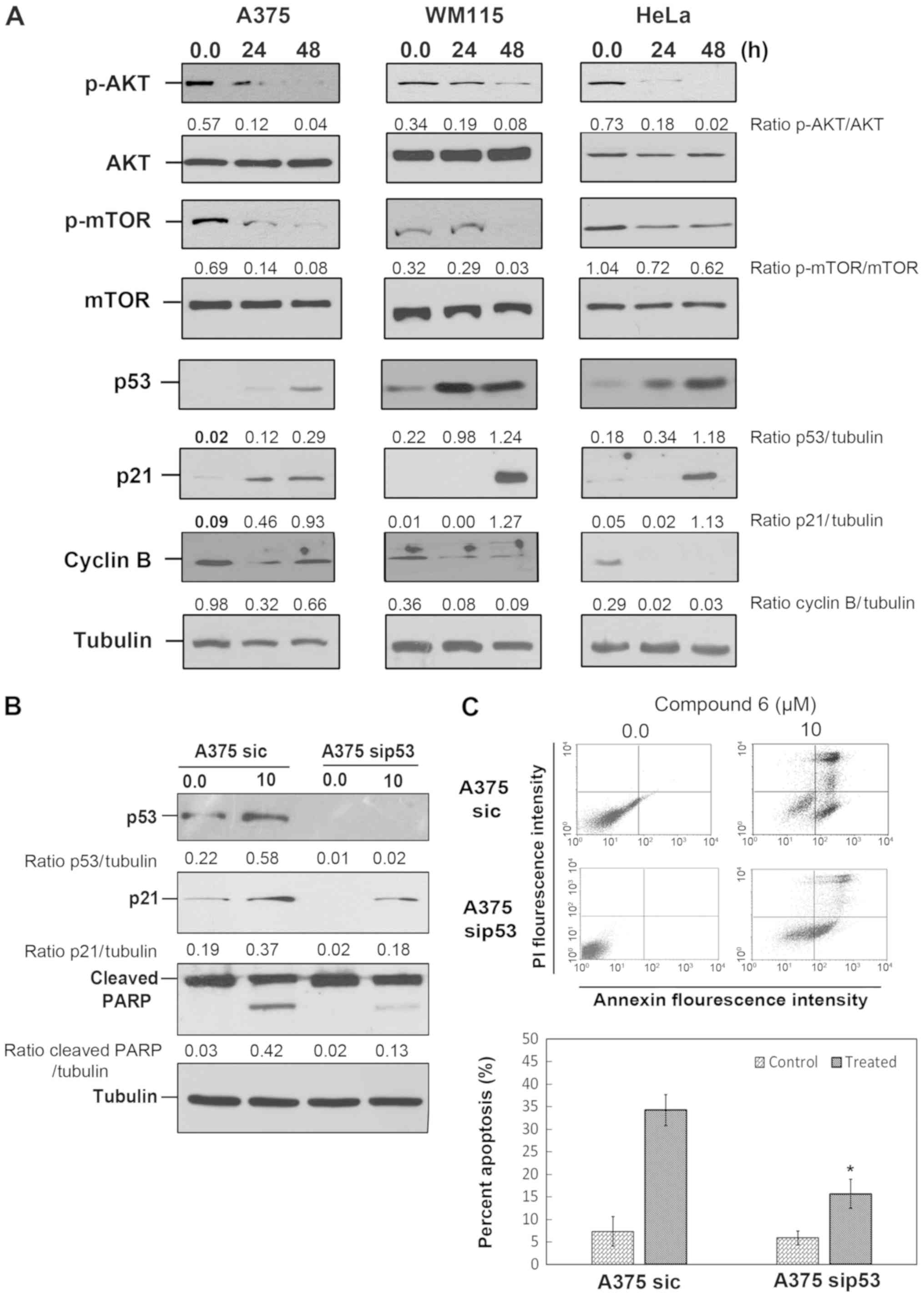|
1
|
Bray F, Ferlay J, Soerjomataram I, Siegel
R, Torre L and Jemal A: Global cancer statistics 2018: GLOBOCAN
estimates of incidence and mortality worldwide for 36 cancers in
185 countries. CA Cancer J Clin. 68:394–424. 2018. View Article : Google Scholar : PubMed/NCBI
|
|
2
|
Chen YJ and Del Priore G: The role of
cisplatin alternative regimens with radiotherapy in cervical
cancer. Gynecol Oncol Rep. 11:38–40. 2014. View Article : Google Scholar : PubMed/NCBI
|
|
3
|
Schadendorf D, Fisher DE, Garbe C,
Gershenwald JE, Grob JJ, Halpern A, Herlyn M, Marchetti MA,
McArthur G, Ribas A, et al: Melanoma. Nat Rev Dis Primers.
1:150032015. View Article : Google Scholar : PubMed/NCBI
|
|
4
|
Patel PM, Suciu S, Mortier L, Kruit WH,
Robert C, Schadendorf D, Trefzer U, Punt CA, Dummer R, Davidson N,
et al: Extended schedule, escalated dose temozolomide versus
dacarbazine in stage IV melanoma: Final results of a randomised
phase III study (EORTC 18032). Eur J Cancer. 47:1476–1483. 2011.
View Article : Google Scholar : PubMed/NCBI
|
|
5
|
Long GV, Stroyakovskiy D, Gogas H,
Levchenko E, de Braud F, Larkin J, Garbe C, Jouary T, Hauschild A,
Grob JJ, et al: Combined BRAF and MEK Inhibition versus BRAF
inhibition alone in melanoma. N Engl J Med. 371:1877–1888. 2014.
View Article : Google Scholar : PubMed/NCBI
|
|
6
|
Sosman JA, Kim KB, Schuchter L, Gonzalez
R, Pavlick AC, Weber JS, McArthur GA, Hutson TE, Moschos SJ,
Flaherty KT, et al: Survival in BRAF V600-mutant advanced melanoma
treated with vemurafenib. N Engl J Med. 366:707–714. 2012.
View Article : Google Scholar : PubMed/NCBI
|
|
7
|
Kim O, Jeong Y, Lee H, Hong SS and Hong S:
Design and synthesis of imidazopyridine analogues as inhibitors of
phosphoinositide 3-kinase signaling and angiogenesis. J Med Chem.
54:2455–2466. 2011. View Article : Google Scholar : PubMed/NCBI
|
|
8
|
Ducray R, Jones CD, Jung FH, Simpson I,
Curwen J and Pass M: Novel imidazo[1,2-a]pyridine base d inhibitors
of the IGF-1 receptor tyrosine kinase: Optimization of the aniline.
Bioorg Med Chem Lett. 21:4702–4704. 2011. View Article : Google Scholar : PubMed/NCBI
|
|
9
|
Goel R, Luxami V and Paul K:
Imidazo[1,2-a]pyridines: Promising drug candidate for antitumor
therapy. Curr Top Med Chem. 16:3590–3616. 2016. View Article : Google Scholar : PubMed/NCBI
|
|
10
|
Hayakawa M, Kawaguchi K, Kaizawa H,
Koizumi T, Ohishi T, Yamano M, Okada M, Ohta M, Tsukamoto S,
Raynaud FI, et al: Synthesis and biological evaluation of
sulfonylhydrazone-substituted imidazo[1,2-a]pyridines as novel PI3
kinase p110alpha inhibitors. Bioorg Med Chem. 15:5837–5844. 2007.
View Article : Google Scholar : PubMed/NCBI
|
|
11
|
Lee H, Kim SJ, Jung KH, Son MK, Yan HH,
Hong S and Hong SS: A novel imidazopyridine PI3K inhibitor with
anticancer activity in non-small cell lung cancer cells. Oncol Rep.
30:863–869. 2013. View Article : Google Scholar : PubMed/NCBI
|
|
12
|
Almeida GM, Rafique J, Saba S, Siminski T,
Mota NSRS, Filho DW, Braga AL, Pedrosa RC and Ourique F: Novel
selenylated imidazo[1,2-a]pyridines for breast cancer chemotherapy:
Inhibition of cell proliferation by Akt-mediated regulation, DNA
cleavage and apoptosis. Biochem Biophys Res Commun. 503:1291–1297.
2018. View Article : Google Scholar : PubMed/NCBI
|
|
13
|
Zheng X, Bauer P, Baumeister T, Buckmelter
AJ, Caligiuri M, Clodfelter KH, Han B, Ho YC, Kley N, Lin J, et al:
Structure-based discovery of novel amide-containing nicotinamide
phosphoribosyltransferase (Nampt) inhibitors. J Med Chem.
56:6413–6433. 2013. View Article : Google Scholar : PubMed/NCBI
|
|
14
|
Cai D, Byth KF and Shapiro GI: AZ703, an
imidazo[1,2-a]pyridine inhibitor of cyclin-dependent kinases 1 and
2, induces E2F-1-dependent apoptosis enhanced by depletion of
cyclin-dependent kinase 9. Cancer Res. 66:435–444. 2006. View Article : Google Scholar : PubMed/NCBI
|
|
15
|
Morjan RY, Qeshta BS, Al-Shayyah HT,
Gardiner JM, Abu-Thaher BA and Awadallah AM: Reaction of
nitrilimines with 5-aminotetrazole and 2-aminopyrimidine. Int J Org
Chem. 4:201–207. 2014. View Article : Google Scholar
|
|
16
|
Aliwaini S, Swarts AJ, Blanckenberg A,
Mapolie S and Prince S: A novel binuclear palladacycle complex
inhibits melanoma growth in vitro and in vivo through apoptosis and
autophagy. Biochem Pharmacol. 86:1650–1663. 2013. View Article : Google Scholar : PubMed/NCBI
|
|
17
|
Al-Qatati A and Aliwaini S: Combined
pitavastatin and dacarbazine treatment activates apoptosis and
autophagy resulting in synergistic cytotoxicity in melanoma cells.
Oncol Lett. 14:7993–7999. 2017.PubMed/NCBI
|
|
18
|
Davies MA, Stemke-Hale K, Lin E, Tellez C,
Deng W, Gopal YN, Woodman SE, Calderone TC, Ju Z, Lazar AJ, et al:
Integrated molecular and clinical analysis of AKT activation in
metastatic melanoma. Clin Cancer Res. 15:7538–7546. 2010.
View Article : Google Scholar
|
|
19
|
Astle MV, Hannan KM, Ng PY, Lee RS, George
AJ, Hsu AK, Haupt Y, Hannan RD and Pearson RB: AKT induces
senescence in human cells via mTORC1 and p53 in the absence of DNA
damage: Implications for targeting mTOR during malignancy.
Oncogene. 31:1949–1962. 2012. View Article : Google Scholar : PubMed/NCBI
|
|
20
|
Vasudevan KM, Barbie DA, Davies MA,
Rabinovsky R, McNear CJ, Kim JJ, Hennessy BT, Tseng H, Pochanard P,
Kim SY, et al: AKT-independent signaling downstream of oncogenic
PIK3CA mutations in human cancer. Cancer Cell. 16:21–32. 2009.
View Article : Google Scholar : PubMed/NCBI
|
|
21
|
Bahrami A, Hasanzadeh M, Hassanian SM,
ShahidSales S, Ghayour-Mobarhan M, Ferns GA and Avan A: The
potential value of the PI3K/Akt/mTOR signaling pathway for
assessing prognosis in cervical cancer and as a target for therapy.
J Cell Biochem. 118:4163–4169. 2017. View Article : Google Scholar : PubMed/NCBI
|
|
22
|
Yang L, Dan HC, Sun M, Liu Q, Sun X,
Feldman RI, Hamilton AD, Polokoff M, Nicosia SV, Herlyn M, et al:
Akt/Protein kinase B signaling inhibitor-2, a selective small
molecule inhibitor of Akt signaling with antitumor activity in
cancer cells overexpressing Akt. Cancer Res. 64:4394–4399. 2004.
View Article : Google Scholar : PubMed/NCBI
|
|
23
|
Garamvölgyi R, Dobos J, Sipos A, Boros S,
Illyés E, Baska F, Kékesi L, Szabadkai I, Szántai-Kis C, Kéri G and
Őrfi L: Design and synthesis of new imidazo[1,2-a]pyridine and
imidazo[1,2-a]pyrazine derivatives with antiproliferative activity
against melanoma cells. Eur J Med Chem. 108:623–643. 2016.
View Article : Google Scholar : PubMed/NCBI
|
|
24
|
Bellet V, Lichon L, Arama DP, Gallud A,
Lisowski V, Maillard LT, Garcia M, Martinez J and Masurier N:
Imidazopyridine-fused [1,3]-diazepinones part 2: Structure-activity
relationships and antiproliferative activity against melanoma
cells. Eur J Med Chem. 125:1225–1234. 2017. View Article : Google Scholar : PubMed/NCBI
|
|
25
|
Ingersoll MA, Lyons AS, Muniyan S, D'Cunha
N, Robinson T, Hoelting K, Dwyer JG, Bu XR, Batra SK and Lin MF:
Novel imidazopyridine derivatives possess anti-tumor effect on
human castration-resistant prostate cancer cells. PLoS One.
10:e01318112015. View Article : Google Scholar : PubMed/NCBI
|
|
26
|
Kuo PL, Hsu YL and Cho CY: Plumbagin
induces G2-M arrest and autophagy by inhibiting the AKT/mammalian
target of rapamycin pathway in breast cancer cells. Mol Cancer
Ther. 5:3209–3221. 2006. View Article : Google Scholar : PubMed/NCBI
|
|
27
|
Chang MC, Chen YJ, Liou EJ, Tseng WY, Chan
CP, Lin HJ, Liao WC, Chang YC, Jeng PY and Jeng JH:
7-Ketocholesterol induces ATM/ATR, Chk1/Chk2, PI3K/Akt signaling,
cytotoxicity and IL-8 production in endothelial cells. Oncotarget.
7:74473–74483. 2016. View Article : Google Scholar : PubMed/NCBI
|
|
28
|
Hirose Y, Katayama M, Mirzoeva OK, Berger
MS and Pieper RO: Akt activation suppresses Chk2-mediated,
methylating agent-induced G 2 arrest and protects from
temozolomide- induced mitotic catastrophe and cellular senescence.
Cancer Res. 65:4861–4869. 2005. View Article : Google Scholar : PubMed/NCBI
|
|
29
|
Aliwaini S, Peres J, Kröger WL,
Blanckenberg A, de la Mare J, Edkins AL, Mapolie S and Prince S:
The palladacycle, AJ-5, exhibits anti-tumour and anti-cancer stem
cell activity in breast cancer cells. Cancer Lett. 357:206–218.
2015. View Article : Google Scholar : PubMed/NCBI
|
|
30
|
Hanson SM, Morlock EV, Satyshur KA and
Czajkowski C: Structural requirements for eszopiclone and zolpidem
binding to the gamma-aminobutyric acid type-A (GABAA) receptor are
different. J Med Chem. 51:7243–7252. 2008. View Article : Google Scholar : PubMed/NCBI
|


















